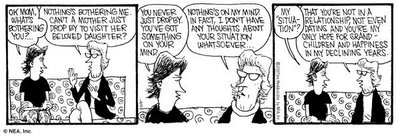
In terms of how long I've been alive, I haven't really identified as a feminist for very long. The first inklings of feminist thought really found their way into my life when I first started college, in a communications class that had a section about the different ways that people of different genders might communicate, and the power structures that are built around those different ways. That was over 15 years ago, sure, but that was just the beginning, and I really didn't start to identify as a feminist until about 5 years or so ago.
Once you're given a new lens through which to look at the world, changes in the way you see the world can sometimes explode sort of exponentially. And, once that lens has been used, it's hard to set it down (which is usually a good thing, though it can make hard, and make acquiring other ways of seeing more difficult, too). The understanding that you begin to acquire, especially the part of it that is hindsight, is bittersweet--its often great to see things more practically, but it's just as often hard to feel like a fool (hindsight) or to feel overwhelmed by all of the work to be done.
As I continued looking at things through the lens of gender and inequality, I started to look back at my life-so-far through different lenses, including the lens of gender and power differentials around gender. For instance, I began to see the enormity of the task my mother took on by raising me mostly on her own in a world which pretty much discouraged her from being financially stable as a woman raising her son on her own. I saw her decision to divorce my stepdad in a new light, because I better understood the emotional and financial complexities involved in such a decision. I also began to look at my own relationships with women--friendships and romantic relationships--through new lenses. I better saw that not only was some of my behavior in the past unconscionable, but that the behavior itself was rooted in patriarchy, in mythic masculinity, and in fear brought on by these constants in my life.
As I said, these realizations were often bittersweet. Nice to finally figure things out a bit better, but the truth hurt. One of the hardest realizations was that I had been the boy (and then the man) who had used the privilege ascribed to me to, among other things, bully women. I don't think I was very aware of this while I was doing it, but that of course doesn't right any wrongs or make me feel much better about the wrongs committed.
In general, my expression of priveledge in this regard was having temper tantrums. I see this now as an expression of priveledge because boys and men aren't discouraged, in certain circumstances, from this type of behavior. It's perhaps a cliche in feminist circles, but it's also true that 'boys will be boys' carries an awful lot of cultural weight. Some of the tantrums were big, some of them little. They could vary from muttering under my breath contemptuously, all the way to me punching walls. Once, in an effort to get a girlfriend to continue our conversation (the entirety of that conversation I now see as me just being a bully), I stood in her way, blocking her from leaving. Like badly setting a screen, I knocked her down. Even at the time I knew that what I had done was just pretty much fundamentally wrong, and I am not proud of my actions. It's hard for me to talk about the fact that I did this--I see myself as a 'different person' now, but I recognize that I am responsible for that action, and always will be; I also understand that it's hard to change. There are times when remembering that event, and others (slamming a door on the way out, for instance) drives me to almost despair. And then I think about how poor-little-me that sort of thinking is; if it drives me to despair, imagine how it might affect the people that were the victims of my actions, in the long run. Which, of course, leads to more despair.
To be very clear, because I think that there are a lot of men who make some changes and then want a cookie, I want to say explicitly that I am not interested in 'credit' for not being that person any longer--but I am interested in how I came to change, how I can change more, and how I can encourage other men to make some of the same changes. (In addition, I suppose, I'm always looking for other role models in this regard, because they seem oftentimes to be few, and hard to spot.)
And I'm also interested in understanding the aforementioned despair, in turning past actions into ways of seeing the present and ways of becoming that will keep such things from happening in the future. To sit in despair is one thing, to continue to try to change for the better is a better thing to do, I think. And one way to help prevent such behavior in myself (and then, in turn, to help others make similar changes) is to try to better understand the underlying causes of such behavior. So in the coming weeks I'll be posting about this, trying to answer some of the questions surrounding men, masculinity and various forms of structuralized encouragement toward violence that men who consider themselves feminists (and feminist allies) have to understand in order to change.
I'd also appreciate hearing any suggestions or stories of change from your own lives. Any encouragement toward change and understanding we can give to each other is helpful...




